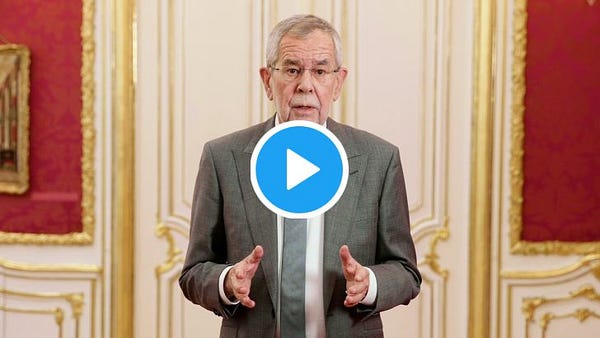Immigration, Again
The deportation of three families to Georgia and Armenia has brought the issue of immigration, which divides Austria's coalition government, back to the fore
Servus!
On Thursday morning, two children were deported from Austria to a country they barely know. Tina, 12, and her sister Lea, 5, were both born in Vienna to a Georgian mother who arrived in Austria in 2006 seeking asylum. After years of appeals and some back and forth, her application was definitively rejected. Tina and Lea were having dinner when the immigration police arrived, given half an hour to pack, and taken to a detention facility in Vienna prior to deportation.
With them in the Viennese facility were Sona, 20, and her brother Ashot, 16. They’ve lived in Austria for seven years now after arriving with the rest of their family from Armenia seeking asylum. Sona had been due to complete her education at a Viennese grammar school this year. On Thursday, she and Ashot were deported to Armenia. The family’s lawyer, Eva Velibeyoglu, told the Standard they now fear Ashot will be called up for military service and dragged into Armenia’s border war with Azerbaijan.
These two deportations took place in the same week as a single mother and her three children—two daughters and a teenage son—were picked up by immigration police in the village of Eichgraben in Lower Austria. The mother, named as Sevinj A., arrived in Austria with her children from Georgia in 2015. This year, her asylum application was rejected. The mayor of Eichgraben described the family as ‘well-integrated’ but Sevinj A.’s right to stay was not his decision to make.

The above has caused a schism in the ÖVP-Green coalition and another debate over Austria’s immigration law, principally its application. For the conservative ÖVP, the matter is clear cut. In the case of Tina and Lea, the mother entered Austria in 2006, applied for asylum, was rejected, left in 2012, came back in 2014, applied again, and was rejected again. In total, the mother had six negative asylum applications to her name. Martina Salomon, editor of the Kurier, a functionally pro-ÖVP newspaper, wrote on Saturday, “You can blame the mother but not the judiciary”: The law is the law and the authorities had no choice but to activate deportation proceedings.
The Greens see things rather differently. The question for them is why families and young children were being made subject to deportation orders in the middle of a global pandemic. Vice-chancellor Werner Kogler called the whole thing “inhumane and irresponsible.” The authorities in Eichgraben, meanwhile, questioned why the family of Sevinj A. had not been and could not be granted the right to stay in Austria on humanitarian grounds considering their integration into the local community.


Paragraph 55 of Austria’s asylum law does allow for special dispensation: a right to stay on humanitarian grounds in compliance with Article 8 of the European Convention on Human Rights, the right to respect for private and family life. Paragraph 56, meanwhile, allows for the granting of residency permits to those who have been in Austria for five continuous years. Why neither of these clauses were invoked in the three aforementioned cases, one cannot say, though the lawyer in the Tina and Lea case did submit an application. In 2014, the right to grant special dispensation was transferred from state and local government to the federal level.
The suggestion is that this latest row could blow up the coalition government. The left wing of the Greens in particular is in uproar. Yet the chasm that lay between the Greens and the ÖVP on the issue of immigration was known before the government was formed in January 2020, and for the Greens, there is no advantage in invoking the nuclear option at the present time, as voters would not reward them taking the country to the polls for the third time in five years. Their only option is to stay and, perhaps, try to pressure for a cabinet reshuffle that sees the interior minister Karl Nehammer, under pressure since last year’s terror attack in Vienna, replaced with a fresh face.
Bis bald!
Thank you for subscribing to the Vienna Briefing. Do you know someone who would be interested in receiving this newsletter? Consider sharing it with them today.
Third Lockdown Ends
The third national lockdown will end on February 8. Shops, museums, and zoos will re-open, with one customer allowed in per every 20 square meters of floor space. Hairdressers and beauty salons will re-open but customers must produce a negative COVID test result when attending their appointments. Schools will re-open in a staggered fashion.
Vaccine Board Hedges
Austria’s National Vaccination Board recommended Sunday the Oxford/AstraZeneca vaccine only be administered to those aged 18 to 64. The board cited a lack of data in available clinical studies about the effectiveness of the vaccine for those aged 65 and over.
Anti-Terror Law Criticized
Austria’s Muslim community, the IGGÖ, has criticized proposed anti-terror measures which they argue threaten their religious freedom. The government proposes creating a national register of imams and subjecting the finances of Muslim cultural associations and houses of worship to an annual audit.




